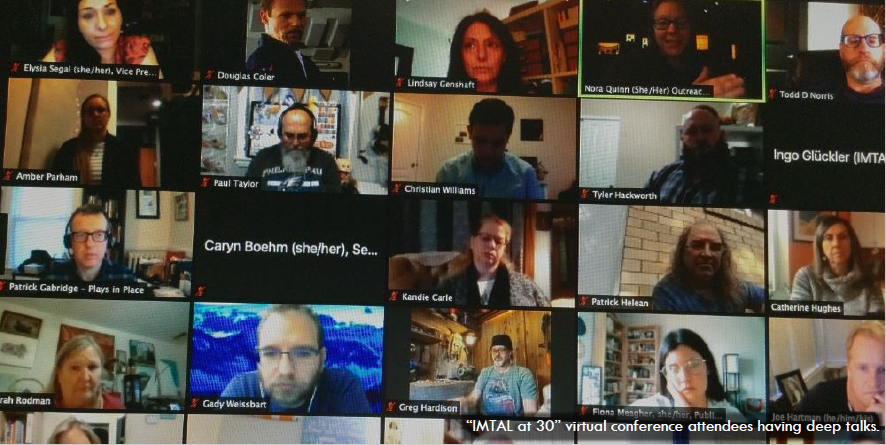By Fiona Meagher

I attended the “IMTAL at 30” conference in a cabin nestled in the Shenandoah Valley. Fellow board members joined sessions from New York City and the Midwest. Some attendees enjoyed the spring weather of Melbourne and Auckland while others joined from the wee hours of a European night. It wasn’t what we’d expected when we started planning for our 30th anniversary, but what a delight it was to bring together so many different faces from different time zones across the branches of our truly International Museum Theatre Alliance. We were able to see our community join in debate, discussion, celebration, nostalgia, and imagination, in a year full of great personal, professional, and societal challenges.
After Catherine Hughes’s remarks, attendees -- both IMTAL members and newcomers to our community -- jumped immediately into discussion with our founder. What are the biggest obstacles facing museum theatre practitioners? How do we fund our work, especially this year? What’s the biggest win you’ve seen for museum theatre in the past 30 years? Catherine expands on some of these queries in the post-script to her remarks.
Next, a quick jaunt into small breakout rooms allowed us to connect with new and old friends. After introductions and some chat, my breakout room bonded over a love of Halloween, morbid histories, and costumes. Look out for the spooky international collaboration, coming at you someday…
Presentations from IMTAL Asia-Pacific followed, led by President Jo Clyne, with a focus on the professional and mental health challenges faced by museum theatre practitioners, as well as the resilience shown by colleagues in the field. IMTAL Asia-Pacific Vice President Patrick Helean of Questacon, Jo Brookbanks of the Auckland Museum, Michael Mills of Heaps Good Production, Barry Kay of Sovereign Hill, and performer Nigel Sutton shared stories about the work they’ve done both on and off site in the past year. They gave many of us in the U.S. who are still under shutdown a glimpse of what reopening our museums might look like. Their insights included ways to navigate institutional prioritization of revenue-generating programs, creative solutions to performing live under health and safety restrictions, and effective methods of virtual programming.
Thursday night ended with a charming slideshow of conferences past. As a newer member of the organization and of the museum theatre field, it was moving to see how many compatriots I’ve had over the years and to hear a bit more
of our history. It put quite a few places on my “Museums to Visit” list, too!
Day Two brought us a Shakespearean presentation from Chair Angela Pfenninger of IMTAL Europe. We heard about the tragedy of the IMTAL Europe conference in March, which suffered from coinciding with the introduction of travel restrictions across the continent. But we also witnessed comedy (the Virtual Pub Crawl of IMTAL Europe) and of course the histories (creative virtual theatre content produced by members). Like Asia-Pacific and Americas members, European museum theatre practitioners faced closures, loss of jobs, and lackluster social safety nets. Angela left us with an invitation to read this newsletter’s sister publication, Insights Europe, available online, and with a note to look out for information on the 2021 IMTAL Global Conference which, hopefully, will take place in person in Athens, Greece this fall.
Next up was a duo of delightful presentations on projects in Philadelphia and in Muncie, Indiana. Paul Taylor and David Wrigley presented on “Science After Hours”, a series at the Franklin Institute. Before the building temporarily closed in March, this series of adults-only themed programming combined demos, activities, quizzes, and refreshments.
Paul and David incorporated museum theatre into these events and enjoyed the freedom to, in their words, “get weird” with pieces about booze, sex, and love. Clips from “Cosmos” and “Tesla’s Dream” showcased a wonderful union of musical talent, artistic video projections, and an electrifying dance sequence inspired by the history of electricity.
We then chilled with Bob Ross -- I mean, IMTAL Americas Treasurer Mason Absher. His institution, Minnetrista, launched the “Bob Ross Experience'' in the onsite classroom where soothing painter Ross’s show, The Joy of Painting, was filmed in the 1980s. Minnetrista links objects, Bob Ross originals and other media, a life-size 80s living room, and occasional Bob Ross painting classes in an interactive and immersive experience. The Experience opened to great acclaim and remains open with health and safety precautions in place. Other happenings at the site include pivoting from their usual traveling theatre shows to a podcast exploring the historic book collection owned by the Ball family who once lived at Minnetrista. Adaptation, always!
We ended our conference with odes to the projects we lost to 2020 and with the “Idea Thunderdome” -- an open discussion about where museum theatre might and should go, both during and after this unique historical moment. As IMTAL President Todd Norris put it, “What happens from here?” Fears, hopes, predictions, and creative solutions flew. The final 90 minutes or so featured a robust discussion of museum theatre’s role in perpetuating and combating systemic and interpersonal racism. The ever-present question of who gets to tell whose stories, and when, sparked deep discussion. There were no brilliant final answers or consensus formed over our practices, but common ground and new perspectives were found. It was clear to me that our field has both a renewed commitment to racial justice and quite a bit of work to do to reckon with our nations’ and our institutions’ pasts.
Just like an in-person conference where we find ourselves in eager discussion at hotel bars long after formal sessions have wrapped, many of us stayed on Zoom far longer than scheduled, and surely many more wished we could have had more time together. I look forward to meeting all of you again in person someday, but this conference proved that distance and a pandemic can’t prevent us from forming meaningful, productive connections. Stay safe.